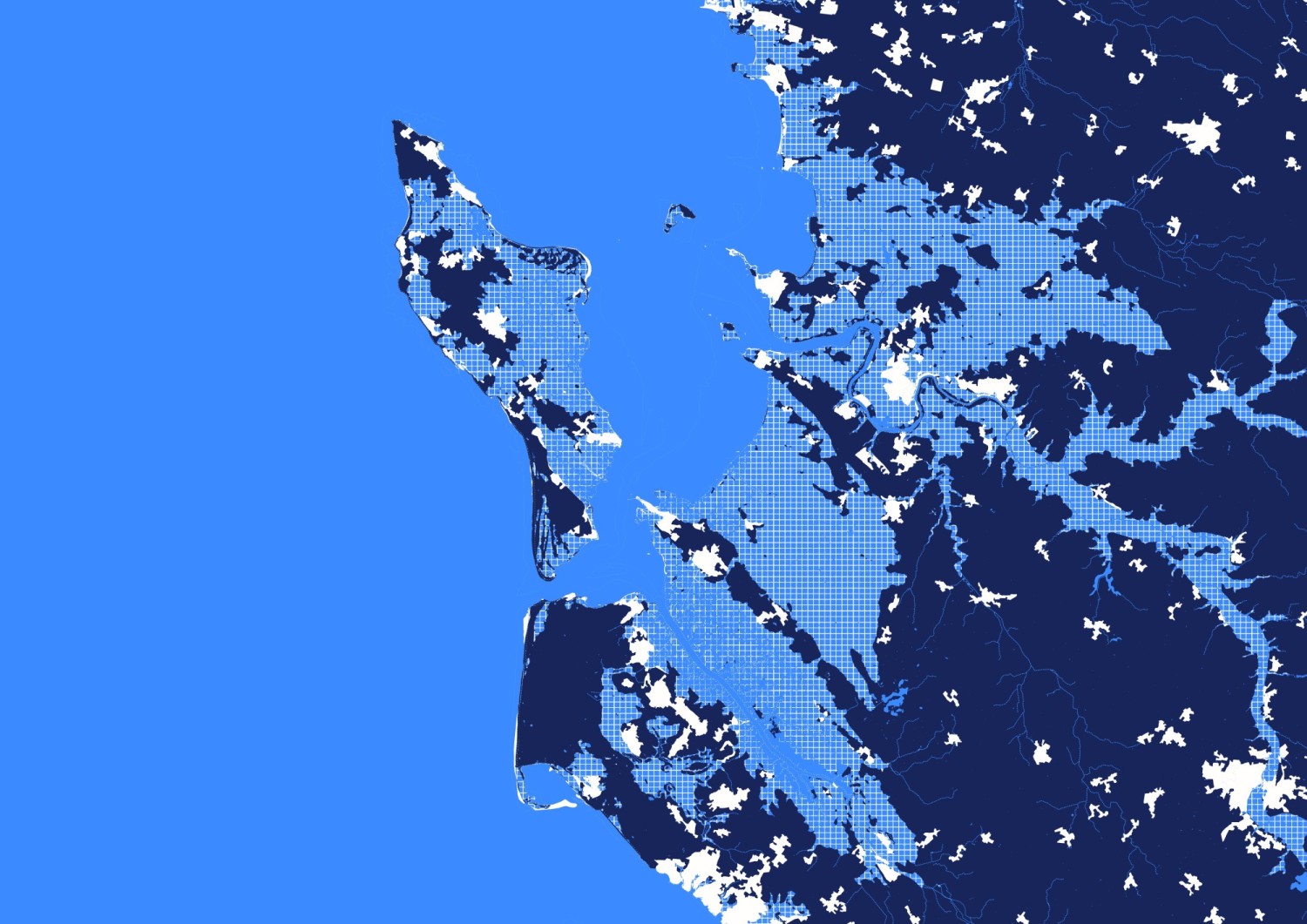The coastline as a project area
The "Le littoral comme territoire de projets" (The coastline as a project area) partnership teaching and research chair of the French Ministry of Culture brings together researchers, teachers, public institutional partners and private economic players around a scientific project focused on the future of coastlines in view of climate risks.
| A scientific project focused on the future of coastal areas Faced with the impacts of climate change, coastal areas are today the focus of numerous concerns: rising sea levels, coastal erosion, ecosystem disruption, intensive coastalization... Today, 60% of the world's population lives less than 100 kilometers from a shoreline. This juxtaposition of remarkable ecosystems and complex urban systems makes these areas dynamic and exemplary. They present the coastline as a singular object of study, whose issues cut across the various fields of study of architecture schools: the discipline of architectural design, urban and landscape design, land-use planning practice, ecological thinking... Recent experiments on coastlines have demonstrated the need to reinterrogate inherited economic, spatial and cultural models. Local and national players have identified challenges to which only new research, methods and experimentation can provide answers. Because it is both a forum for debate and a source of knowledge, the territory project is the scientific driving force behind the Chair. Not only does it enable us to analyze existing processes so as to reinvent them, it also federates the various players involved, so as to re-enchant the future. This "designed" territorial project plays a central role in the approach: it refers to the common language of architecture, urban planning and landscape, and engages the project approach. Through experimentation in the territories, the launch of research and the introduction of new teaching, the Chair aims to consolidate and disseminate its expertise to meet the contemporary challenges of the coast. |
| *Focusing on this particularly cross-disciplinary theme, the "Coastline as a project territory" partnership teaching and research chair brings together researchers and teachers, public institutional partners and private economic players. The result of a long-standing collaboration between the Paris-Est School of Urban and Regional Architecture and Puca, the chair was established in 2018, with the arrival of new partners with local roots and specific technical contributions: the École Nationale Supérieure d'Architecture de Marseille, Artelia, the Université Gustave Eiffel and the Université des Antilles et de la Guyane. Since 2019, the chair has been accredited by the French Ministry of Culture. The chair is under the scientific responsibility of Éric Alonzo, architect and urban planner, professor and researcher at the École d'architecture de la ville & des territoires Paris-Est, and Sébastien Marot, environmental historian and philosopher, HDR professor and researcher at the École d'architecture de la ville & des territoires Paris-Est. From 2018 to 2021, the chair was coordinated by Thomas Beillouin, architect and urban planner, Doctor of Architecture. It is now coordinated by Isaline Maire, architect, urban planner and doctoral student. |
| The Chair's players |
|---|
| Paris-Est School of Architecture |
| Éric Alonzo architect-urban planner, professor, co-director of the DSA d'architecte-urbaniste (École d'architecture de la ville & des territoires Paris-Est), researcher at the OCS laboratory (École d'architecture de la ville & des territoires Paris-Est), scientific co-director of the partnership chair "le littoral comme territoire de projets" Sébastien Marot environmental historian and philosopher, HDR professor, researcher at the OCS laboratory (École d'architecture de la ville & des territoires Paris-Est), scientific co-director of the partnership chair "le littoral comme territoire de projets" Isaline Maire architect-urban planner, doctoral student at the INAMA (ensa-Marseille) and Urbanistica (Istituto universitario di architettura di Venezia) laboratories, second doctoral student of the chair, associate lecturer & research engineer at the OCS laboratory (École d'architecture de la ville & des territoires Paris-Est), current coordinator of the partnership chair "le littoral comme territoire de projets". |
| École Nationale Supérieure d'Architecture de Marseille |
| Laurent Hodebert architect-urban planner, professor, researcher at the INAMA laboratory (ensa-Marseille), coordinator of the partnership chair "le littoral comme territoire de projets" for ensa-Marseille Éric Dussol architect-urban planner, lecturer, researcher at the Project(s) laboratory (ensa-Marseille) Frédéric Gimmig architect-urban planner, lecturer and practitioner |
| Plan Urbanisme Construction Architecture (Puca) |
| Hélène Pesquine architecte et urbaniste de l'État, secrétaire permanente Emmanuelle Durandau architecte et urbaniste de l'État, secrétaire permanente adjointe |
| Artelia |
| Bernard Couvert geographer, engineer and hydromorphology specialist, project director, head of Consulting and Strategy Thomas Beillouin architect-urban planner, project manager at Artelia, associate researcher at the OCS laboratory (École d'architecture de la ville & des territoires Paris-Est), first doctor of the chair and coordinator from 2018 to 2021, consultant and referent of the chair "le littoral comme territoire de projets" at Artelia Melissa Belmekki urban planner, project manager and consultant for the chair "le littoral comme territoire de projets" with Artelia |
| University environment |
| Bruno Barroca architect and geomatician, HDR lecturer, Université Gustave Eiffel - Paris-est Nacima Baron geographer, HDR lecturer, Université Gustave Eiffel - Paris-est Pascal Saffache geographer, HDR Professor, Université des Antilles et de Guyane |
Scientific Director (in French)
Éric Alonzo
Sébastien Marot
Coordination
Isaline Maire
Partners
École nationale supérieure d'architecture de Marseille
Artelia
Plan Urbanisme Construction Architecture (Puca)
Université des Antilles et de la Guyane
Gustave Eiffel University
To be continued
→ Observatoire
→ research fields
→ research areas
→ Download the brochure
↓
write to us
Illustration
Oleron Island facing the risks of rising sea levels, Isaline Maire, 2022
